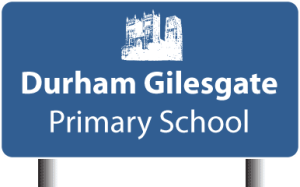Our Enhanced Mainstream Provision for the Hearing Impaired
Durham Gilesgate Primary School is a mainstream community Primary school with nursery provision. The school is additionally resourced for children who have a severe or profound hearing loss or who are deaf. Some children have other special educational needs in addition to their hearing loss. For example, some children may be autistic; in these instances, the Sensory Team and school staff work in unison to meet the needs of the child.
The Enhanced Mainstream Provision in school provides good listening conditions for small groups and /or individual teaching. Pupils with a hearing loss are fully included in the school and where appropriate are taught predominantly within the mainstream class. Each child is a member of the class according to their chronological age and is fully included in the life of the school. The children are encouraged to participate in the full range of school activities.
Staffing and Support
Staff from the Sensory Team, which is part of Durham County Council’s SEND and Inclusion Team, are based in the school site. This specialist team comprises of qualified Teachers of the Deaf, an Education Audiologist, a Specialist Speech and Language Therapist, a Communication Support Worker, a Deaf Worker and Specialist Support Workers. The children with hearing loss work in different situations, either in their class with support when necessary, or in the Enhanced Mainstream Provision for individual teaching/support or small group teaching. Support is timetabled according to the individual needs of each pupil.
Specialist Equipment
Each morning when pupils arrive at school, they come to the Enhanced Mainstream Provision and have their hearing aids or cochlear implants checked to ensure they are working optimally. The Sensory Team also supply pupils with a Radio Aid system if appropriate. Our Educational Audiologist oversees the management of the equipment. We are keen to update specialist equipment as and when there are new technology advancements.
Teaching & Learning
As far as possible, the pupils work alongside their hearing peers in class. The Sensory Team staff liaise closely with class teachers to discuss planning and class work is differentiated accordingly. When appropriate, pupils work in the base, where listening conditions are more suitable, and where staff can focus on specific targets. Teaching outcomes are set regularly for each pupil as part of the Sensory Intervention Plans and these are taken into account when planning activities.
Communication
Our approach to communication is very broad. We provide the most appropriate means of communication to meet the needs of individual pupils and use Sign Supported English, which incorporates many of the signs from British Sign Language (BSL) used alongside spoken English. It is not only the Sensory Team staff who sign in school, but the whole school community as well. School staff are able to use signing and many staff have qualifications in BSL. Sign is often used in school productions and the children enjoy learning signed songs. Our Deaf Worker is qualified to teach BSL and works with staff, parents and pupils to develop sign language skills and to support communication.
Early Reading and Phonics
Many of our hearing-impaired children will be able to learn phonics alongside their classmates. Sometimes, children with a hearing loss will have access to phonic teaching using cued articulation or other adaptions to assist them or they may benefit from small group teaching in one of the resource base rooms. Occasionally, a very small minority of complex deaf children may not be able to access phonic teaching dependant on the level of their hearing loss. They will be taught to read using other methods.
Home/School Links
Partnership between parents and school is very important. Each child has their own home/school book in which staff and parents can share information about the children.
Staff from the Sensory Team based at the school:
- Teacher of the Deaf: (Mandatory Qualification) Debra Proctor
- Teacher of the Deaf: (Mandatory Qualification) Ali Gray
- Specialist Speech and Language Therapist: Rachel Millward
- Education Audiologist: (Mandatory Qualification) Melanie Jones
- Deaf Worker: Lyndsay Tatters
- Communication Support Worker: Kay Temple
Specialist Support Workers:
- Becky Abernethy
- Margaret Downing
- Kathleen Forsyth
- Tracy Purvis
- Louise Rayson
- Brenda Reddington
- Kerry Moore
- Yvonne Walton
